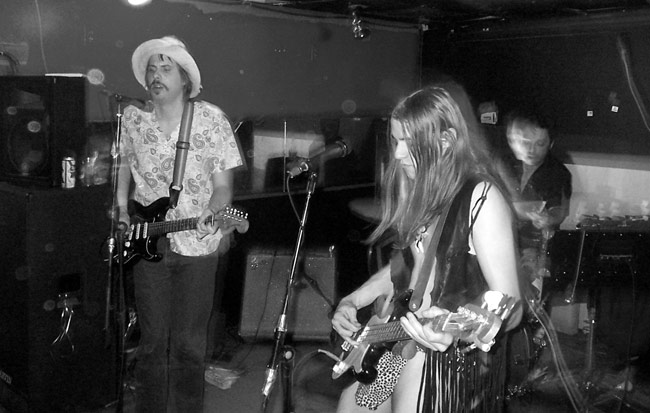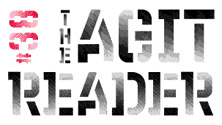
You Can Go Anywhere
by Ron Wadlinger
About a year ago, the Box Elders rolled in to Columbus during one of their first large-scale tours of the country. Those in the audience who showed up—mostly due to the solid buzz surrounding the band’s debut 7-inch on Grotto Records—left fully converted by the live set. The three-piece, which features brothers Jeremiah and Clayton McIntyre on guitar and bass, respectively, and Dave Goldberg on drums and keys, masterfully blends garage, pop and punk sounds into a potent mix then topped off by lyrics that tend to explore the surreal and bizarre.
“Hole In My Head,” off the Grotto single, was one of the underground anthems of 2008, with its Phillip K. Dick–inspired tale supported with a raw, vintage guitar sound and supremely catchy melodies. The band has put together a solid stable of songs that live up to those found on that first slab, and its live show has developed to include a touch of the theatrical that compliments the high-energy performances. To see this band is to see rock music played in its purest form.
Box Elders’ most recent stop in Columbus found the band playing to a larger audience that went home just as satisfied as those who were there last year. Before they took the stage, I sat down with Jeremiah, Clayton and Dave to catch up and get the scoop on the flood of new records that’s fast approaching.
I think your 7-inch was one of the standout records that I picked up last year, one that holds up after repeated listens, and I know there’s a good number of people that feel the same way. Were you surprised at the reception it got?
Jeremiah McIntyre: Of course you think your record’s good, but yeah, we were surprised at how well it sold, especially online. People blogged about it a lot. I thought that zine culture disappeared, but I think they all started blogs. People that like records and really care about music were writing about it, and people bought it, so I guess it got to the right people.
The record has a really cool sort of retro sound that suits the songs really well. Was that something you intentionally went for?
Clayton McIntyre: We had a friend of ours, Steve Sampley, who played in the Shanks from Omaha. He had a four-track and came over and recorded us in our basement.
JM: He’d been doing mutant punk rock four-track recordings for a long time. He got a really good recording; it was what we wanted to hear. We had tried recording twice before that, and when we heard that we were like, “Yeah, this is it.”
You put on a pretty energetic and entertaining live show, with a drummer who often simultaneously plays the keyboard as one of its more interesting aspects. Was this something you intentionally wanted to do, or was this a talent that you somehow stumbled upon?
CM: Well, Dave’s one of the best drummers and best keyboard players we know, so we figured he might as well do them both at the same time.
JM: We didn’t want to have four people in the band.
CM: We wanted something to fill out the sound.
JM: Dave says we are slavedrivers.
Dave, had you ever played both drums and keyboards in a band before?
Dave Goldberg: No, this was the first band. It took some doing. I would spend 10 hours practicing a 30-second passage.
Is it a fairly common reaction for people to be so surprised that you’re playing both?
DG: Yeah. You know, I’ve been trying to practice humility, but if I wasn’t, I’d say it’s just on account of me totally ruling.
JM: It makes the show fun to watch. If people are going to pay to watch you play, you’ve got to give them something to watch.
DG: I mean, how many times have you listened to a record, and then went to see a band, and it was just like, you might as well stay home and listen to the record? We try to avoid that.
What kind of reactions have you been getting from the crowds on tour?
JM: It’s been great. We’ve been in the South for the last week and a half, and kids down there are just really wild and excited about rock & roll, unabashed.
DG: Yeah, they don’t stand there with their arms crossed.
You’ve been operating with this line-up and touring for a good amount of time now. Do you feel like your songwriting or sound has changed or evolved at all during the past year or so?
JM: It’s been going a lot slower than we’d like. Clayton’s going to school about an hour and a half away, but I think he’s going to take some time off so we can focus on getting stuff done. We’re doing a record that’s supposed to be out in April on Goner. We’re doing a Hozac single, and Jay Reatard’s going to do a single on Shattered. And we want to do a single with Douchemaster, so we’re trying to get more done.
CM: We have to write a lot of songs over the next few months, but I think it’s going to work out good.
What’s it like being a band from Omaha?
JM: Omaha’s a great space. It’s in the middle, so strategically to tour it’s a great place to be. It’s cheap to live; there’s really cool record stores there; there’s really cool venues; there’s really cool people there. Omaha has always been surprisingly hip for a city its size in the middle of the country. People are always blown away when they come to Omaha to go to a show. They never would have guessed.
CM: People always seem surprised to hear that we’re from Omaha. It might as well be the moon.
JM: A lot of people think for some reason that it’s in Ohio. “Omaha, that’s in Ohio, right?” There’s been papers before, and it’s like, “Box Elders from Ohio.”
Ohio, Nebraska—it’s kind of the same thing.
JM: I can kind of see that. When we came to Columbus, we kind of felt that everyone here was on the same wavelength.
Are there any other bands that you feel are doing things similar to you guys or any bands in Omaha that you’re particularly in to?
JM: Brimstone Howl is really great.
CM: I like the Dinks, who used to be the Shanks.
JM: The guys that put out our 7-inch on Grotto Records have this really cool band called Mr. Wizard that’s really Southern kind of pop.
So the LP, were those songs recorded over the past year?
JM: It’s stuff we’ve been writing for a year, but we started recording it in September. It will be 14 or 15 songs.
Are you using the same kind of recording set-up as with the 7-inch?
CM: It’s a little different. It’s more DIY—we’re doing it ourselves—but instead of a four-track, we’ve got an eight-track.
Do you notice many differences operating with the eight-track?
JM: Yeah, we can make mistakes over and over again.
DG: The first recording, we had to have the drums and organ on one track.
JM: It seemed to go easier then, because we just had to do it. Now, we can pick over details, which I don’t know is necessarily the best. That’s probably why it’s taking longer, but it’ll be good. We’re happy with the way it sounds; it’s just slower.
